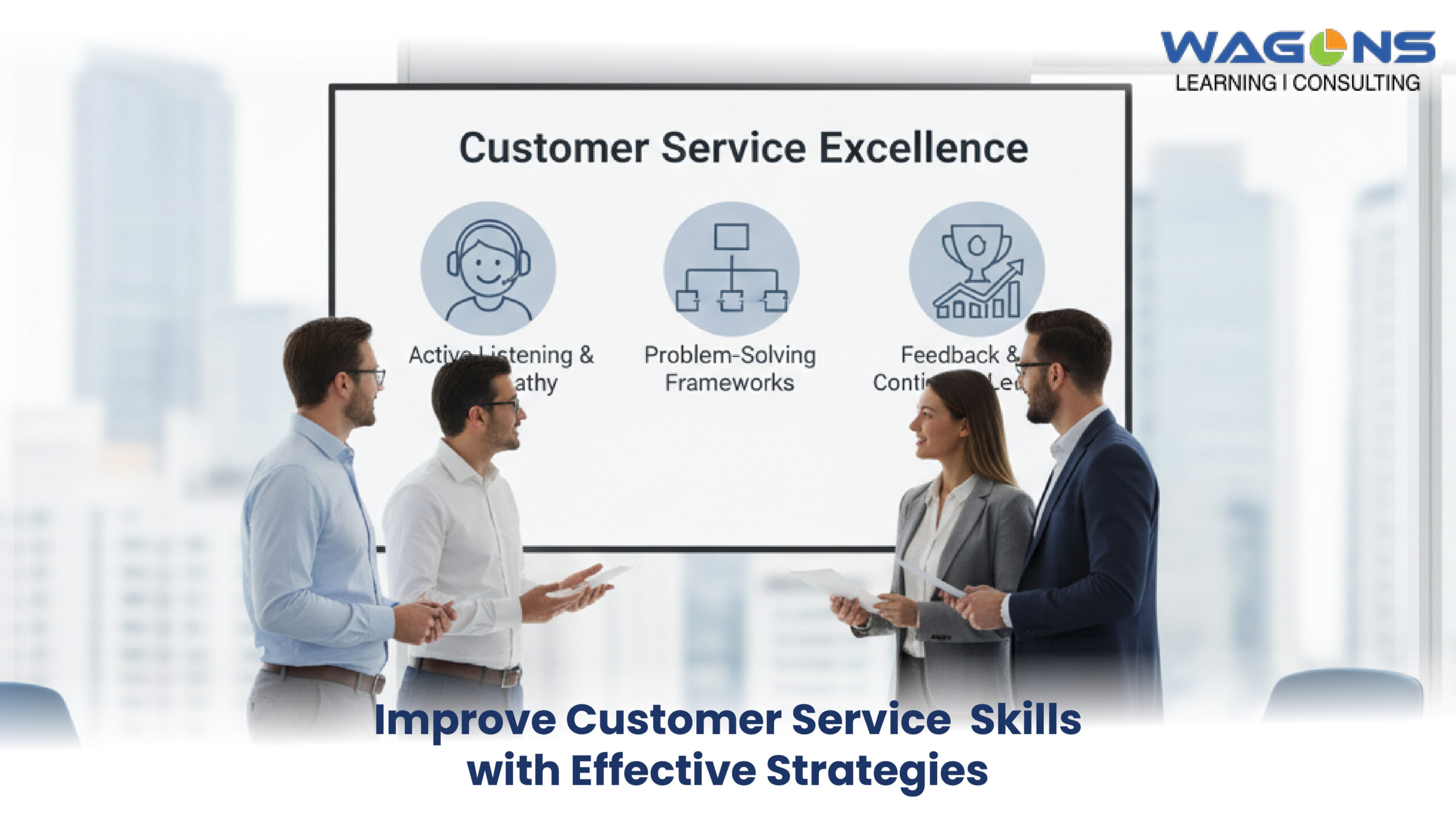Poor customer service costs businesses $75 billion annually in the United States alone. Your customers abandon ship after just one negative interaction 32% of the time, according to PwC research. This reality hits enterprise sales and support teams particularly hard, where each lost client represents a significant revenue impact. The solution lies in systematically developing your team’s customer service capabilities. When you improve customer service skills across your organization, you create a competitive advantage that drives measurable business growth. Companies with superior customer experience generate 5.7 times more revenue than competitors who lag in customer service excellence. Modern customers expect exceptional service at every touchpoint. Your team needs specific, trainable skills to meet these elevated expectations and convert challenging interactions into loyalty-building moments.
Why You Must Improve Customer Service Skills for Business Growth
Research from Salesforce reveals that 89% of consumers switch to competitors after experiencing poor customer service. This statistic becomes even more critical when you consider that acquiring new customers costs five times more than retaining existing ones. Superior customer experience (CX) directly correlates with increased customer loyalty and revenue growth. Companies that prioritize customer service skills development see higher profit margins compared to those that don’t invest in service training. In today’s competitive marketplace, strong customer support skills serve as the primary differentiator for enterprise-level sales and support teams. Your service quality often determines whether prospects become clients and whether clients become long-term partners.
Mastering Foundational Customer Support Skills
Every exceptional customer service professional builds their expertise on core foundational skills. These abilities form the bedrock of positive customer interactions and create the framework for advanced service techniques.
Using Active Listening to Understand Core Customer Needs
Active listening goes beyond hearing words. This skill requires full attention, verbal confirmation, and emotional awareness during customer conversations. Effective active listening involves three key components:
- Physical attention: Eliminate distractions and focus completely on the customer
- Verbal confirmation: Paraphrase customer concerns to ensure understanding
- Emotional awareness: Recognize the underlying feelings behind customers words
Research from Harvard Business Review shows that customers feel 4.6 times more satisfied when service representatives demonstrate genuine active listening skills. This translates directly to increased customer retention rates. Train your team to ask clarifying questions like “What I’m hearing is…” or “Help me understand…” These phrases demonstrate engagement and prevent miscommunication that leads to service failures.
Cultivating Empathy: A Critical Skill for Positive Customer Interaction
Empathy transforms transactional exchanges into relationship-building opportunities. When representatives genuinely understand customer emotions, they can address concerns more effectively and create stronger connections. Microsoft’s Global State of Customer Service report indicates that customers believe empathy is essential for positive service experiences. Develop empathy through perspective-taking exercises and emotional intelligence training. Teach your team to acknowledge customer feelings with phrases like “I understand how frustrating this must be” before moving to solution mode.
Key Communication Skills for Customer Service Excellence
Communication excellence separates good service from exceptional service. Your team needs specific communication techniques that consistently elevate customer interactions and resolve issues effectively.
The Importance of Positive Language in Customer Communication
Positive language shapes customer perception and influences interaction outcomes. Words create emotional responses that either build or damage customer relationships. Replace negative phrases with positive alternatives:
- Instead of “I can’t do that,” say “Here’s what I can do for you”
- Replace “That’s not my job” with “Let me connect you with the right person”
- Change “You didn’t…” to “Let’s make sure we…”
Advanced De-escalation: A Vital Customer-Facing Skill for High-Stakes Issues
De-escalation skills become critical when customers experience frustration or anger. Your team needs proven techniques to calm tense situations and guide conversations toward resolution. Effective de-escalation follows a structured approach:
- Acknowledge emotions: Validate customer feelings without accepting blame
- Lower your voice: Speak calmly to influence customer tone
- Find common ground: Identify shared goals for resolution
- Offer specific solutions: Present concrete next steps
Strategic Skills to Increase Customer Satisfaction and Retention
Beyond foundational and communication skills, your team needs strategic capabilities that directly impact business outcomes. These advanced skills transform customer service from a cost center to a profit driver.
Leveraging Deep Product Knowledge as a Problem-Solving Skill
Comprehensive product knowledge enables representatives to solve problems quickly and suggest valuable solutions. When your team understands products deeply, they can anticipate customer needs and provide proactive assistance. Implement regular product training sessions and create easily accessible knowledge resources. Your team should understand not just product features, but how those features solve specific customer problems.
Turning Customer Feedback into Better Service Skills
Customer feedback provides direct insight into service skill gaps and improvement opportunities. Smart organizations use this feedback systematically to enhance team capabilities. Analyze feedback patterns to identify skill development priorities:
- Response time concerns indicate a need for efficiency training
- Communication complaints suggest language and tone improvement needs
- Resolution issues point to problem-solving skill gaps
Zendesk research shows that companies acting on customer feedback see 15% improvement in customer satisfaction within 90 days of implementing changes.
Time Management: A Key Skill for an Efficient Customer Support Team
Efficient time management enables representatives to provide thorough service without creating customer wait times. This skill balances quality interaction with productivity requirements. Teach your team to:
- Prioritize issues based on urgency and impact
- Use templates for common responses while maintaining personalization
- Schedule follow-ups proactively to prevent recurring issues
Organizations with strong time management practices achieve 31% faster resolution times while maintaining higher satisfaction scores.
Conclusion: A Holistic Approach to Improving Customer Service Skills
Excellence in customer service requires a combination of foundational, communication, and strategic skills working together seamlessly. No single skill creates exceptional service – the integration of multiple capabilities produces results that drive customer loyalty and business growth. Continuous training remains essential for maintaining high levels of customer satisfaction. As customer expectations evolve and business environments change, your team’s skills must advance accordingly. The investment in comprehensive skill development pays measurable dividends through increased retention, higher satisfaction scores, and improved revenue per customer. When you improve customer service skills systematically, you create sustainable competitive advantages that compound over time.
Build an Elite Team with Wagons Learning’s Sales and Customer Service Training
Whether your goal involves acquiring new high-value clients or retaining them for life, the underlying skills prove crucial for success. Wagons Learning provides targeted training solutions designed to elevate your teams’ performance and drive measurable business results. Our programs combine proven methodologies with real-world application, ensuring your team develops skills that translate directly to improved customer outcomes and business growth.
For driving revenue and client acquisition: Explore our Advanced Sales Training Programs
For boosting loyalty and satisfaction: Discover our Customer Service Excellence Solutions
Transform your customer service capabilities with expert-led training that delivers results. Contact Wagons Learning today to discuss customized solutions for your organization’s specific needs.




